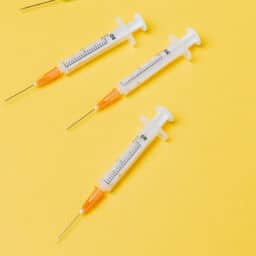INTRODUCTION
The Parliament has passed the Assisted Reproductive Technology (Regulation) bill 2020 to bring the ART clinics and ART banks under one law so that they can be regulated and supervised from the ground level. Further, this bill will help in ensuring that this technology will not be misused, safe procedure is provided with the necessary manpower and medical resources. It was first introduced on 14 September 2020 during the monsoon session in the Lok Sabha but was referred to a Parliamentary Standing Committee in October 2020 for further analysis and research. With India becoming one of the global centres for medical services and especially reproductive services in particular the Government felt a need for regulating and supervising these art clinics and banks to prevent the industry’s exploitation. In India, nearly 27.5 million couples are recorded to be infertile. With this bill becoming law ethical practices and safety procedures will be ensured in the future.
HOW IS ASSISTED REPRODUCTIVE TECHNOLOGY DEFINED IN THE BILL?
According to Section 2 sub-clause (C) The term “Assisted Reproductive Technology refers to all the techniques that attempt to obtain a pregnancy by handling the sperm or the oocyte (a cell in the ovary that may undergo division to form an ovum {the female gamete}) outside the human body and transferring the gamete or embryo into the reproductive system of a woman.” Unlike the Surrogacy Regulation Bill, these services can be availed not only by commissioning couples (a married couple who is infertile) and single women but also live-in partners, and also foreigners. The present number of ART clinics in India is recorded to be 40000.
HOW CLINICS AND BANKS ART WILL BE REGULATED?
The National Board will have the responsibility of monitoring and implementing the bill, reviewing and revising its provisions from time to time, and advising the Central Government regarding any changes to be made and introduced as seem necessary. Further, it will lay down a protocol to be followed by the persons working in the clinic, minimum standards of foundation, necessary research diagnostic equipment, and expert staff to be employed. Section 8(1) states that the State Board will take into account the suggestions, policies, and regulations, of the National Board and coordinate with it for the enforcement and implementation of the policies and guidelines for Assisted Reproduction and pass such orders directed by it.
A National Registry for Clinics and Banks will be set up which will contain details of clinics and banks including the types and nature of services provided by them, their outcome, and all the necessary information. It will also provide its data to the National Board to make guidelines. The Registration Authority will emerge as an authority to grant, suspensor cancels the license of an ART clinic, investigate the breach of regulations and advise the National Board on modifying the existing regulations or provisions on the ART service. Within sixty days from the date of establishment, an application should be made through the State Board to the National Board for registration.
DUTIES OF ART CLINICS AND BANKS
An ART bank has been defined as an organization that supplies sperm, oocyte, to ART clinics or interested parents. According to Section 2(1)(e), AN ART clinic means – “any premises equipped with requisite facilities and medical practitioners registered with National Medical Commission for carrying out the procedures related to the assisted reproductive technology.”
The commissioning couple and single women should be eligible to avail of the services and that has to be ensured by the clinics. The consent of all the parties (the donor, commissioning couple, and single women) should be obtained before starting the procedure. The Clinics should give professional counselling to them about the consequences and chances of success of ART procedure, their side effects, risk of multiple pregnancies and help them to reach a decision keeping in mind all the possibilities of success and risks which would be in the best interest of the commissioning couple. The respective clinics must educate the commissioning couple and the single women about the rights of a child born through this procedure…
The Clinics and the Banks should also ensure that the information about all the parties (their name, identity, and address) should be kept confidential and it should not be parted to anyone except for the records controlled by the National Registry and at the request of commissioning couple in a medical emergency. A grievance cell should be set up for making a complaint in matters related to the ART clinics and banks.
WHO ARE ELIGIBLE?
- Oocytes can be retrieved from a woman between the ages of 23 to 35.
- Semen can be obtained from men between the ages of 21 to 55.
The provisions under the bill also state that a woman can only become once in her lifetime an oocyte donor provided that she is married and has one child of a minimum of three years old. The ART Bank should also examine the donors before starting the medical procedure for the diseases as may be prescribed.
PRECAUTIONS AND STANDARDS TO BE FOLLOWED BY ART CLINICS AND BANKS
Section 27(3) strictly prohibits the Bank from supplying the sperm or oocyte of a single donor to more than one commissioning couple. The consent of the commissioning couple should be taken for doing any research by an organization registered under the ART Act on the unused oocyte. The gamete or embryo storage for more than ten years is not allowed. The sale, transfer, and use of embryos outside India are prohibited except in the transfer of own gamete with the permission of the National Board.
According to Section 31(1), a child born with the help of ART procedure will be regarded as a natural child of the participating couple and the said child will have all the rights and privileges available to a natural child… A donor shall not have any parental rights over the child born from his/her gamete. Section 22(1)(b) mandates the commissioning couple to provide insurance to the oocyte donor for any specified loss, damage, complication, or death of donor during the process from an insurance company or agent recognized under IRDAI ACT 1999. Pre-Implantation Genetic Testing is permitted to recognize any genetic defects arising in embryos through in vitro fertilization.
PENALITIES
The Clinic is prohibited from providing any couple or women with a child whose sex is pre-determined by them. It shall not do or permit any act which increases the probability that a child will be pre-determined sex. The Clinic or Bank shall not advertise or communicate such services regarding facilities of sex-selective assisted through ART technology. Anyone who violates this provision under section 32(2) shall “attract imprisonment of not less than five years which may extend to ten years or a fine, not less than ten lakh rupees which may even extend to twenty-five lakh or both.”
Also, any medical practitioner shall not transfer any human embryo into a male person or any animal, take advantage of the couple, women, or exploit the human gamete, use intermediaries to obtain gamete donors, exploit the child born from this procedure. Whoever violate the above-stated provisions under Section 33(2) will be punished with a fine, not below than five lakh rupees which may go up to ten lakh rupees, and for subsequent contraventions’ imprisonment, not below than eight years and may add up to twelve years with a fine, not below than 10 lakh which may be extended to 20 lakh rupees.
SHORTCOMINGS OF THE BILL
Single men, people belonging to the LGTBQ community cannot avail of these ART services. Because of Adoption rules 2017, a single man cannot adopt a girl and that’s why he cannot avail of this bill’s benefits. This bill is criticized as it violates Article 14 of the Constitution, which deals with the Right to equality. Any human being shall not be deprived of who wants to have a child whether it’s a man, woman, transgenders, or even same-sex couple. This bill also reinforces the conservative thinking about a woman who only can donate an egg when she has fulfilled her marital duties (has a child of a minimum of three years).
The rights of same-sex couples which were recognized in Navtej Singh Johar v. Union of India are also been violated. This is completely illogical on the part of the bill to grant these services to foreigners and not to a same-sex couple who is residing in India. The bill talks about donations of human gametes which is contrary to Art Banks becoming economically viable in the country. Also, no expenses will be provided to the oocyte donor even though the egg retrieval process can even risk her life and she will not be able to exercise any freedom to withdraw her consent during that process Another point that has to be taken care of is the expensive procedure which many poor childless couples cannot avail. The government should consider supporting these poor childless couples. Data privacy of the parties should be maintained and the provisions relating to them should be strict.
CONCLUSION
The tabulation of the Assisted Reproductive technology bill is a welcome step for setting standards and regulations of these clinics and banks. As the health minister correctly remarks that we don’t want assisted reproductive technology to become an industry. The bill’s implementation from the level ground will ensure that ethical practices are followed and safe procedure is provided. However, everyone should be entailed to avail these services which the bill needs to take care of when it becomes a law.
Author(s) Name: Himanshi Garg (UILS, Panjab University, Chandigarh)
















